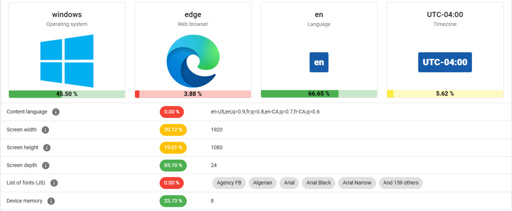- cross-posted to:
- [email protected]
- cross-posted to:
- [email protected]
Amidst the glossy marketing for VPN services, it can be tempting to believe that the moment you flick on the VPN connection you can browse the internet with full privacy. Unfortunately this is quite far from the truth, as interacting with internet services like websites leaves a significant fingerprint. In a study by [RTINGS.com] this browser fingerprinting was investigated in detail, showing just how easy it is to uniquely identify a visitor across the 83 laptops used in the study.
As summarized in the related video (also embedded below), the start of the study involved the Am I Unique? website which provides you with an overview of your browser fingerprint. With over 4.5 million fingerprints in their database as of writing, even using Edge on Windows 10 marks you as unique, which is telling.



Pfft amateur, I break into my local Applbee’s after 2AM and use their POS terminal browser to look at used cars.
Applebee’s at 2AM which leaves a physical trail? Noob. I strap meshtastic nodes on wild dogs, using them as a Internet relay at 1-2kb a second, to look at manga leaks.
I randomly separate by data packages & encode that data into the DNA of various insects & such critters that then burrow down to the tier 1 and tier 2 internets & are trained to transmit that data.
A separate group is standing by at different locations to collect the data & report back to me the results of me signing into my Google account with my full name & billing address as well as the results of by image search for “naked boobs”.
There is a bit of ping, but the bandwidth can be scaled nicely.